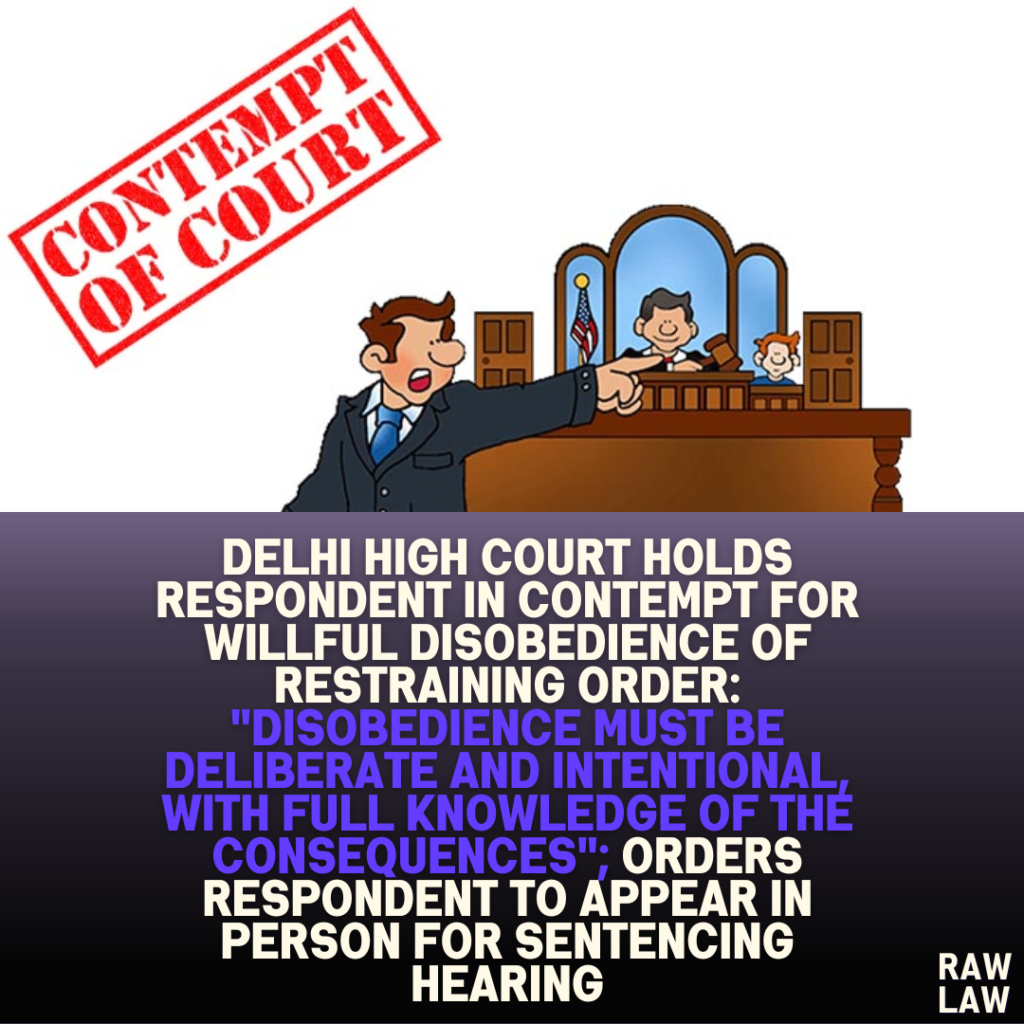Court’s Decision:
The High Court of Delhi held the respondent in contempt for willfully violating the court’s restraining order dated May 30, 2018. The court found that the respondent made payments to the judgment debtor despite being fully aware of the restraining order. The court directed the respondent to appear physically for a hearing on the quantum of sentence.
Facts:
The petitioner filed a contempt petition under Sections 10, 11, and 12 of the Contempt of Courts Act, 1971, alleging that the respondent willfully disobeyed a court order dated May 30, 2018. The petitioner and the judgment debtor (J.D.), who are brothers, were involved in a property dispute concerning a jointly owned property. The J.D. borrowed Rs. 10,00,000 from the petitioner but failed to repay it, leading to execution proceedings. During these proceedings, the court issued a restraining order prohibiting the respondent from making further payments to the J.D., which the respondent violated by making payments of Rs. 5,00,000 each on three occasions.
Issues:
Whether the respondent’s actions constituted willful disobedience of the court’s restraining order dated May 30, 2018.
Whether the respondent is liable for contempt under the Contempt of Courts Act, 1971.
Petitioner’s Arguments:
The petitioner argued that despite the restraining order, the respondent knowingly and deliberately made payments to the J.D. The petitioner contended that the respondent was fully aware of the order and the consequences of violating it. The petitioner provided evidence of three payments made by the respondent to the J.D. in June and July 2018, in clear violation of the court’s directives.
Respondent’s Arguments:
The respondent argued that the payments made to the J.D. were not deliberate violations of the restraining order. The respondent sought to justify his actions by claiming that certain payments were already committed before the order was passed. The respondent also filed an application under Order 21 Rule 46C CPC, seeking a trial to determine his liability toward the J.D., but the application was dismissed.
Analysis of the Law:
The court examined the provisions of the Contempt of Courts Act, 1971, and noted that contempt requires willful disobedience of a court order. It referred to legal precedents, including U.N. Bora v. Assam Roller Flour Mills Assn., which stated that willful disobedience must involve a deliberate and intentional act, with full knowledge of the consequences.
Precedent Analysis:
The court referred to U.N. Bora v. Assam Roller Flour Mills Assn., which laid down the conditions for holding someone in contempt, emphasizing the need for deliberate, conscious, and intentional disobedience of a court order.
Court’s Reasoning:
The court concluded that the respondent’s actions were deliberate and constituted wilful disobedience of the restraining order. The court rejected the respondent’s arguments, stating that the payments made were not accidental or unintentional but were carried out with full knowledge of the court’s order. The court held that the respondent’s conduct demonstrated a lack of respect for judicial authority.
Conclusion:
The court found the respondent guilty of contempt for willfully violating the restraining order. The respondent was directed to appear in person for a hearing on the quantum of sentence to be imposed.
Implications:
This judgment reinforces the strict enforcement of court orders, especially in contempt proceedings. It also highlights the necessity for individuals to adhere to judicial directives and the consequences of deliberate disobedience, as the court may impose severe penalties, including committal or sequestration, in such cases.




Pingback: Bombay High Court Strikes Down 2023 IT Rules Amendment as Unconstitutional, Citing Failure to Define Key Terms like "Fake" and "Misleading," Rendering the Rule Vague and Overbroad - Raw Law